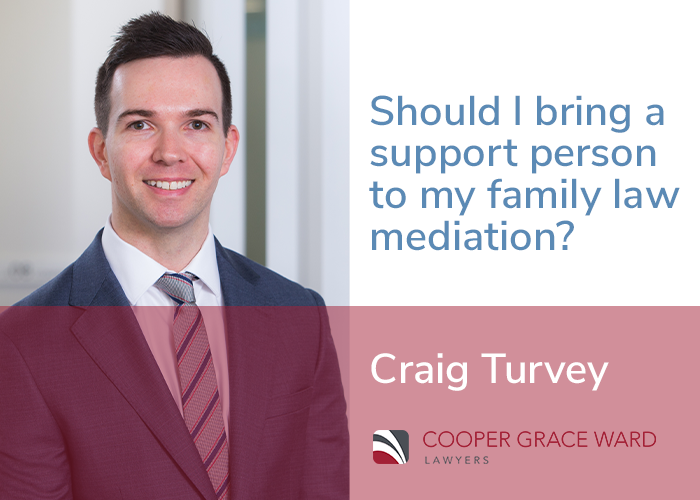In this video, special counsel Craig Turvey talks about support people and their role in your family law matter.
Video transcript
Hi. My name’s Craig Turvey and I’m a special counsel at Cooper Grace Ward in the Family Law work team. Today, I’d like to talk to you about support people and their role in your family law matter.
What is the role of a support person?
Support people can be a useful tool. Divorce or a separation from a long term partner, it’s one of the most stressful things a person can go through. So, it’s only natural that people will turn to close friends or family members for emotional support. That’s great. However, I’ve noticed there’s a particular sort of trend lately where people are bringing perhaps not just one, they want to bring two support people into their family law mediation.
Now that can be a useful tool if the person needs some sort of emotional comfort or just someone there to bounce ideas off, who can sort of promote the goal of working towards something sensible. However, in my experience lately there seem to be a lot of support people who overstep the boundaries.
When are support people overstepping?
Maybe they’ve done a little bit of their own, sort of Google research and they think they know what they’re talking about, or they’re just genuinely trying to be helpful, but perhaps a bit misguided in terms of what they think the right approach should be.
So, my suggestion to you would be if you’re going to involve support people in terms of coming to a mediation or any sort of negotiation in your family law matter, think about the advice they’re giving to you. Is it just emotional comfort or are they actually giving you advice, for example, saying, ‘oh, I think you’re entitled to more than that’, or ‘she shouldn’t be getting that much’. If you hear those sorts of comments in your head, I’d suggest you should probably rejig and reassess their role in terms of helping you in a mediation, because that’s the job of your lawyer, is to tell you that kind of stuff.
Your best mate might have the best intentions in the world for you, but it’s not particularly helpful for them to be pushing you down the wrong path.
What should I do next?
So, if you have any mediations that are coming up, if you’d like to talk to a family lawyer about mediations, what that might involve, whether you should bring any support people, please don’t hesitate to contact me or one of the other family lawyers at Cooper Grace Ward.





